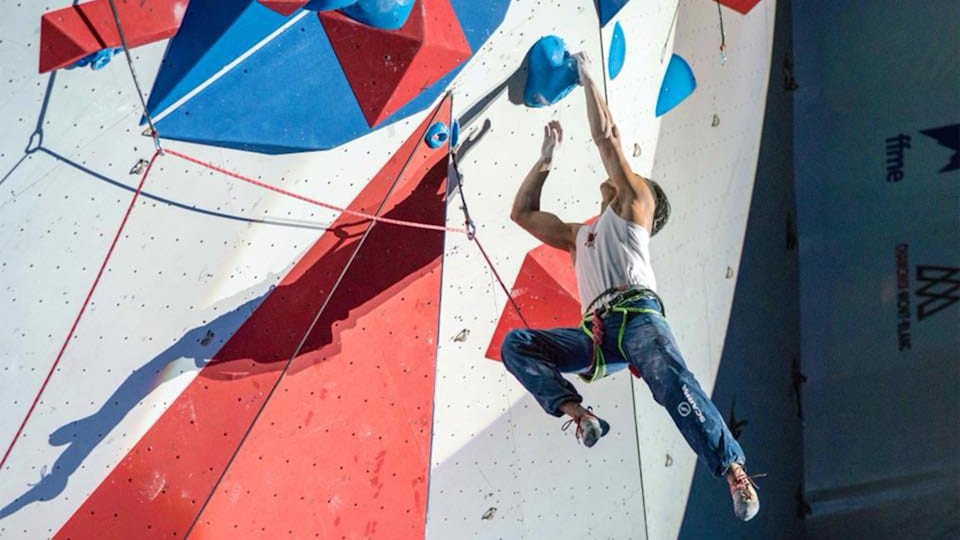Secrets of sport climbing with four-time world champion Sean McColl
The formula for excelling at sport climbing, one of five sports joining the Olympic programme at the Tokyo 2020 Games, is wild and varied. It can range from never doing the dishes to employing a 100m sprint coach, as Canada’s all-round expert Sean McColl reveals.

There is arguably no one better qualified than Canada’s Sean McColl to throw light on the preparations being made by those hoping to win sport climbing’s first ever Olympic gold medal. The 31-year-old has been competing at the very top for more than two decades and was a leading advocate for Olympic inclusion. As the overall world champion in four of the past 10 seasons, he is also one of the favourites for golden glory in Tokyo.
First up, McColl is keen to point out that the biggest challenge for many has been adapting to the fact that sport climbing’s first Olympic champion will be the athlete with the best combined result based on scores across three traditionally separate disciplines – lead, bouldering and speed.
“There is no blueprint on how to train for all three [disciplines] at the same time,” said McColl, the current world No.5 in the combined format. “You can’t look historically, you can’t even ask many older competitors. Each of us is really having to decide what percentage of time we will spend on each discipline.”
McColl does have something of a head start compared to his rivals in this regard. The Vancouver native has been an all-rounder from the very beginning, always revelling in the multifaceted demands of each distinct discipline.
Top training tips: lead
“Lead is our aerobic discipline, even though it is only six minutes long; the routes contain between 40 to 60 moves, so you need endurance,” he said of an event which requires competitors to scale a wall higher than 15m, clipping their rope into pre-fixed runners on the way up. Placings are decided by the height reached, with time used as a tie-breaker.
“Lead specialists are lean like long-distance runners. A lot of the training is just spending time on the wall. You have to be so strong.”
Top training tips: bouldering
Part of the magic for fans watching sport climbing in Tokyo will be the sheer variety of challenges on show. Once competitors reach the bouldering wall, they will have four minutes to unpick the puzzle of varied routes up 4m-high walls, each requiring distinct skills. All athletes will come to the problems fresh, having been held in a closed waiting room, and no ropes will be used.
“The whole point of it is that it is extremely hard to do a boulder first try, and it is how you adapt to going from falling and it looking like it is impossible to actually completing the climbs in time,” McColl explained.
“The scoring is based on who completes the most boulders in as few attempts as possible. It is athletic, you have jumping, you need coordination – there is a hint of parkour, using your momentum. It is almost like you are a gymnast, but instead of creating your own routine you are given a set routine to do which you have to do perfectly.”
Top training tips: speed
Speed climbing is perhaps the most jaw-dropping of the three disciplines, with athletes racing up 15m-high walls with a six-degree overhang in little more than the blink of an eye.
“It is the most scientific to train for, because it is so close to athletics,” said McColl. “Coaches use slo-mo replays. The way you start speed is very similar to the way you start the 100m. The world record for men right now is 5.48 seconds, so the start is obviously vital.
“You know where you need muscle to be a speed climber. You train doing the route blindfolded. It’s all about repetition.”
One key skill
McColl, who has five World Cup wins and 23 podiums to his name, is unequivocal about the single most important attribute in sport climbing.
“It is incredibly important to have finger strength,” he laughed, before explaining how he tries to make his digits the strongest in the business.
“I take it to the extreme. I will do dead hangings where I will do 60 15-second hangs [on a fingerboard training device] with a rest of 45 seconds between each, so it takes an hour on the dot. There are a whole load of different types of holds, you start with the hardest when you are freshest and then move towards the slightly easier ones.”
Perhaps naturally, given their prominence, climbers are extraordinarily preoccupied with looking after their precious hands.
“Some refuse to do the dishes,” McColl smiled. “I actually don’t mind doing dishes, but I am picky in the morning, I have a real hard time until my hands are warmed up, so I wear gloves all the time. Some people use saltwater to look after them, some people run current through water, they use creams, gels. You do what works or what you think works.”
Collaboration is key
Canada’s finest is incredibly proud that even during the Olympic final, collaboration will remain at the heart of his sport. While competitors cannot watch their fellow climbers take on the lead and bouldering challenges, they do all share a timed period before competition, during which they study together the routes set and discuss ways of solving them.
“It is a part of our sport that is pretty wonderful,” McColl said. “In climbing we are never really competing directly against another competitor. Something I tell someone is never going to hurt me. It might make that climber stronger, and if I can help them get there, then that’s great.”
